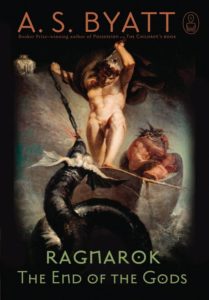
Back in November, I was sad to hear of A.S. Byatt’s death. Having re-read Possession somewhat recently, at least in the grand scheme of things, I instead picked up her Ragnarök, which was written as part of a series of novellas that rewrote various myths.
Byatt chooses to tell the story of Ragnarök through the POV of a "thin child," evacuated from London during the Blitz, who reads a 19th-century book of Norse myths and revels in all their uncertainty and contradictions and distance—as Byatt herself did in her own childhood. It’s a neat way of dealing with the question of whether to attempt psychological realism, especially when the present-day reader is so far removed from the mindsets of the original audience. I’m not entirely sure I agree with Byatt (in the afterword) that a modern retelling requires personalities, but I do appreciate the clear-cut stand the book takes on this: these are myths as understood by a child who is reading from a non-modern source, and therefore there shall be none of that.
One might well find the conceit of the book a little on-the-nose, which is fair; reality is not always a defense against such reactions. It works for me. More importantly, the prose is so good that I just want to roll around it in. I wish I could analyze what makes Byatt’s prose so compulsively readable to me, because I cannot put my finger on it. But it is; I even got a quarter of the way into The Virgin in the Garden before I remembered that I don’t really like mainstream fiction.
Finally, the bit about the cow made me remember this delightful family tree by Korwin Briggs.